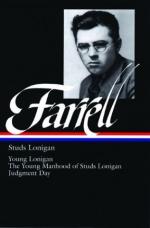|
This section contains 1,196 words (approx. 4 pages at 300 words per page) |

|
A landmark in American literature has just been achieved with the publication of James T. Farrell's fiftieth book, The Dunne Family. Farrell is known as one of the major Chicago novelists, a naturalist, a modern classic. Yet in many people's minds, he has been locked into a dead-issue decade; his work is thought to be synonymous with the reductive struggles and frustrated ideals of the 30's. The irony is that during the 30's Farrell was not only popular and recognized, with his fiction praised in the leading journals, but a member of the avant-garde, and already looked upon with suspicion by the dogmatists of proletarian literature. In his critical writings during the "Red Decade" he considered writers not then in fashion, such as Joyce and Ibsen, and confronted issues, like the social functions of literature, with an independent spirit. Again and again he declared that literature lay beyond...
|
This section contains 1,196 words (approx. 4 pages at 300 words per page) |

|


